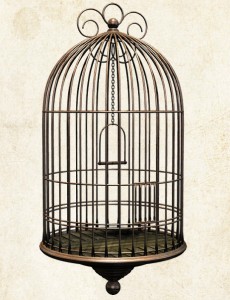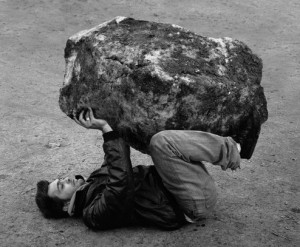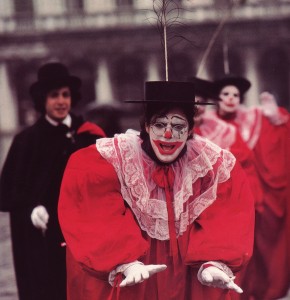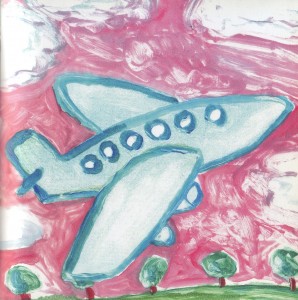It Is Natural
 I’ve been getting ready for my upcoming retreat with Ajahn Sucitto by listening to some of the dharma talks he gave at his last retreat. The talk I listened to last night was especially wonderful. The title is The Natural Stream to Liberation and he starts by reading this selection from the Numerical Discourses. (The talk is an hour long, but it would almost be enough just to listen to him read this sutta, which is on the first 7 minutes of the tape. To listen, click here.)
I’ve been getting ready for my upcoming retreat with Ajahn Sucitto by listening to some of the dharma talks he gave at his last retreat. The talk I listened to last night was especially wonderful. The title is The Natural Stream to Liberation and he starts by reading this selection from the Numerical Discourses. (The talk is an hour long, but it would almost be enough just to listen to him read this sutta, which is on the first 7 minutes of the tape. To listen, click here.)
For a virtuous person, one whose behavior is virtuous,
no volition need be exerted:
“Let non-regret arise in me.”
It is natural that non-regret
arises in a virtuous person, one whose behavior is virtuous.
For one without regret,
no volition need be exerted:
“Let joy arise in me.”
It is natural that joy arises in one without regret.
For one who is joyful,
no volition need be exerted:
“Let rapture arise in me.”
It is natural that rapture arises in one who is joyful.
For one with a rapturous mind,
no volition need be exerted:
“Let my body be tranquil.”
It is natural that the body of one with a rapturous mind is tranquil.
For one tranquil in body,
no volition need be exerted:
“Let me feel pleasure.”
It is natural that one tranquil in body feels pleasure.
For one feeling pleasure,
no volition need be exerted:
“Let my mind be concentrated.”
It is natural that the mind of one feeling pleasure is concentrated.
For one who is concentrated
no volition need be exerted:
“Let me know and see things as they really are.”
It is natural that one who is concentrated knows and see things as they really are.
For one who knows and sees things as they really are,
no volition need be exerted:
“Let me be disenchanted and dispassionate.”
It is natural that one who knows and sees things as they really are is disenchanted and dispassionate.
For one who is disenchanted and dispassionate,
no volition need be exerted:
“Let me realize the knowledge and vision of liberation.”
It is natural that one who is disenchanted and dispassionate realized the knowledge and vision of liberation.
Thus Bhikkhus, the knowledge and vision of liberation is the purpose and benefit of disenchantment and dispassion.
Disenchantment and dispassion are the purpose and benefit of the knowledge and vision of things as they really are.
The knowledge and vision of things as they really are is the purpose and benefit of concentration.
Concentration is the purpose and benefit of pleasure.
Pleasure is the purpose and benefit of tranquility.
Tranquility is the purpose and benefit of rapture.
Rapture is the purpose and benefit of joy.
Joy is the purpose and benefit of non-regret.
And non-regret is the purpose and benefit of virtuous behavior.
Thus, Bhikkhus, one stage flows into the next stage,
one stage fills up the next stage,
for going from the near shore
to the far shore.
(Anguttara Nykaya, The Book of the Nines.)
What’s Not There
 Last night I listened (for the second time) to a wonderful talk by Phillip Moffitt, given at the end of the month-long retreat held this past February at Spirit Rock. The talk is called Liberation Now Leads to Full Liberating Awareness and in it, Phillip uses poetry (as well as examples from his own practice) to convey a sense of what all these teachers/sages/poets are talking about when they use words like “liberation.” (click here to listen to the talk)
Last night I listened (for the second time) to a wonderful talk by Phillip Moffitt, given at the end of the month-long retreat held this past February at Spirit Rock. The talk is called Liberation Now Leads to Full Liberating Awareness and in it, Phillip uses poetry (as well as examples from his own practice) to convey a sense of what all these teachers/sages/poets are talking about when they use words like “liberation.” (click here to listen to the talk)
Here is one of the poems from the talk that really spoke to me. It’s called What’s Not Here, by Rumi.
I start out on this road,
call it love or emptiness,
I only know what’s not here.
Resentment seeds, backscratching greed,
worrying about outcomes, fear of people.
When a bird gets free,
it does not go for remnants left on the bottom of the cage.
Close by, I’m rain. Far off,
a cloud of fire. I seem restless,
but I am deeply at ease.
Branches tremble. The roots are still.
I am a universe in a handful of dirt,
whole when totally demolished.
Talk about choices does not apply to me.
While intelligence considers options,
I am somewhere lost in the wind.
That Monkey Brain Needs Love
Over the weekend, I listened to a wonderful series of talks by Rick Hanson called No-Self in the Brain, given at a recent day-long event at Spirit Rock. Rick is a neuropsychologist and a New York Times best-selling author, who wrote Buddha’s Brain, and now has a new book out called Hardwiring for Happiness: The New Brain Science of Contentment, Calm and Confidence.
 He talks about how we have evolved with different “layers” in our brain. The first — and most primitive — is what he calls the “Lizard Brain,” which is primarily concerned with being safe. This is the nervous, will-I-be-OK? part of the brain.
He talks about how we have evolved with different “layers” in our brain. The first — and most primitive — is what he calls the “Lizard Brain,” which is primarily concerned with being safe. This is the nervous, will-I-be-OK? part of the brain.
The next is the “Mouse Brain,” which is primarily concerned with finding and getting nourishment. This is the hungry, will-there-be-enough? part of the brain.
And the last is the “Monkey Brain,” which is primarily concerned with establishing and maintaining social connections. This is the needy, am-I-loved? part of the brain.
We all have each of these, of course, but many of us have one that tends to be more easily triggered. In the talks (and I assume, in his book), Rick offers ways — in mediation — that we can relax and soothe these different parts of the brain.
The “Lizard Brain” can be soothed by noticing–and then staying with–those time when we feel a sense of safety and confidence.
The “Mouse Brain” can be soothed by noticing/staying with those time when we feel a sense of sufficiency and contentment.
And the “Monkey Brain,” (which seems to be my personal favorite) can be soothed by noticing/staying with those time we we feel a sense of loving and being loved.
What We Let Go Of
 I love what Winnie Nazarko said in the Dharma Seed talk we listened to on Monday night. The talk was all about “letting go,” which we hear a lot about. What I love is her clarity.
I love what Winnie Nazarko said in the Dharma Seed talk we listened to on Monday night. The talk was all about “letting go,” which we hear a lot about. What I love is her clarity.
“What we let go of…..is suffering.”
So it’s not that we need to let go of what we want. It’s that we need to let go of the suffering caused by wanting what we want.
It’s fine to want something. But if that something is not possible…like, for example, you want the information you’ve been given about the Burmese visa application process to be accurate, reliable, and readily available…then continuing to want it, when it’s clear that that’s simply not the way it is…just adds suffering to what is already a difficult situation.
So….keep doing what you can to comply with the visa application requirements, keep checking to see if the first application has been approved, have a back-up plan in case it doesn’t look like it’s going to happen before the plane takes off….and let go of the continual thought that it shouldn’t be like that.
Whether it should or shouldn’t is beside the point.
It is what it is.
There’s a lot less suffering when you deal with it like that.
I’m Thankful I’m Alive
In honor of Thanksgiving, I offer this excerpt from an article by Wes Nisker, reprinted in the latest issue of Spirit Rock News….for which I am also thankful:
 Strange to say so, but one of the best things I learned in meditation is that I’m alive. I had rarely noticed it, but through increasing awareness of body and breath I began to pay attention to this mysterious condition. Now my identity includes the fact that I am one of the living! I am a live one!
Strange to say so, but one of the best things I learned in meditation is that I’m alive. I had rarely noticed it, but through increasing awareness of body and breath I began to pay attention to this mysterious condition. Now my identity includes the fact that I am one of the living! I am a live one!
You too are a member of the sangha of the living. Welcome. Glad you could make it. Life on earth is now appearing as (your name here).
The path of meditation reminds us that we are alive by leading us from our heads into our bodies. We come down from the story of our life to the fact of our life.
My teacher S.N. Goenka told me to sweep my body with awareness, and slowly but surely I became familiar with my nose and my toes, and what the poet Mary Oliver calls the world of “lime and appetite, the oceanic fluids.” This bag of bones and seawater came alive and started to take over my ego as the foundation of my identity. You might say, I was “born again,” as an animal. I had to join a grand and venerable sangha.
When I witness myself in the story of evolution, I feel a surge of compassion for the struggles of all my life. Let’s face it, the basic rules on this planet are nasty and brutish. But the phrase, “May all being be happy” has a deeper ring to it when I regard myself in the same world as those who dress in feathers, fur, scales, leaves and bark.
Now when I sit in mediation I can feel my aliveness, my mammalian condition, my species self. I also sense my practice as part of a group effort by human beings to awaken to a new kind of freedom and sanity. In the light of that big perspective, I thank you for being on my team, part of this exciting project, helping us all to realize our precious, collective, human potential.”
***
(image from Carnaval de Venise, by Fulvio Roiter)
More Questions, More Answers
 If you listened to Joseph Goldstein answer questions from yogis during the second half of the 3-month retreat at IMS (which I posted about here) and you were hoping for more — you’re in luck! There’s a new Q&A session with Joseph posted on Dharma Seed, in which he talks about all kinds of wild and wonderful things including: creativity, the hallucination of wrong view, trauma, stream entry, and much more. Click here to listen.
If you listened to Joseph Goldstein answer questions from yogis during the second half of the 3-month retreat at IMS (which I posted about here) and you were hoping for more — you’re in luck! There’s a new Q&A session with Joseph posted on Dharma Seed, in which he talks about all kinds of wild and wonderful things including: creativity, the hallucination of wrong view, trauma, stream entry, and much more. Click here to listen.
And the Answer Is….
 Last night the Dharma Seed KM Group listened to a great talk, given by Joseph Goldstein during the second half of the 3-month retreat at IMS (going on right now), in which he answers several excellent questions (submitted in written form) from some of the people at the retreat.
Last night the Dharma Seed KM Group listened to a great talk, given by Joseph Goldstein during the second half of the 3-month retreat at IMS (going on right now), in which he answers several excellent questions (submitted in written form) from some of the people at the retreat.
The questions are:
(1) What is the difference between mindfulness, awareness and consciousness? And how can we practice seeing these as not self?
(2) Is this all there is….getting lost in fantasy, coming back to this seat, meeting the hindrances, coming back to the various vibrations and weird pressure sensations of the body? Everything feels empty, like it’s really just the six sense doors over and over…even out in real life, there’s no role or position or partner or adventure or success or house or anything outside of this. No matter what, it’s just the six sense doors. Frankly it’s feeling depressing and I’ve been feeling it for a year now. I feel this sense of grief and sometimes rage and am desperately wanting it to be something more than empty. But it’s said that the joy is in the emptiness. Can you help me/us feel that’s true or possible?
(3) Sometimes I feel so much joy I want to start skipping, but I fear it would disturb others. Should I just skip? Or is this not appropriate?
(4) I am a 3-month yogi. During the course of the retreat, I have gotten insight from direct experience that when tormenting mind states arise, it is based on either something that happened in the past or something that may happen in the future. At first these tormenting states would sweep me away for a day or two. I couldn’t even recall that it was impermanent. Now as of the last two times these states arose, there is greater space and awareness that this too will pass…that its nature is impermanent. How long do tormenting mind states continue to arise? What is their purpose? Are they a regular part of practice? Aside from doing no harm, noting, seeing its impermanence, metta and forgiveness, are there any other tools to use to get free from these states of mind that indeed torment?
(5) In the Satipatthana Sutta, there is a lot of talk about observing things internally, externally or both internally and externally. What constitutes an internal observation? What constitutes an external observation? What is the significance of this distinction?
(6) When doing Forgiveness Practice, when is it appropriate to ask the other person to actually forgive you instead of just saying the phrases in your head?
(7) Suppose re-birth really happens and accept it…there is no me, no mine, no myself. Who or what gets reborn?
(8) Who and what is the “managing unit” that seems to be behind the decisions? There is some managing agent that decides to go fishing for enlightenment…or whatever fish is chooses to go fishing for. Or to have a sitting or walking meditation…or to walk slow or fast…and where to turn the attention to….or to ask this question. Who is this agent?
Interested in the answers? Listen to what Joseph has to say here.
Farelong, Oh Crumpleweed
 Note: I will be away on retreat until Oct 24, so there will be no new DharmaTown postings until I return.
Note: I will be away on retreat until Oct 24, so there will be no new DharmaTown postings until I return.
***
At the last Dharma Seed KM meeting before my retreat, one of our members (Roberta!) brought home-made muffins (which she often does!) and this time she decorated one of them (for me!) with a “banner” that read:
Farelong, oh Crumpleweed, our friend! We’ll miss you!
This was especially wonderful since it’s a quote from something my teacher, Lila Wheeler, had read in one of the talks we’ve listened to. (You can hear the talk here.)
Here’s the whole quote:
Whenever I part with my kids or my husband, I always try to say something loving because I imagine a car crash or somebody’s heart giving out, and I don’t want my last words to be impatient or distracted. Neither do I want my “I love you’s” to become automatic. So I’ve been trying to come up with ways to say good-bye that are unique, intimate, and genuine.
For several years when my son was young, he used to say to me, “Farelong, oh Crumpleweed, my friend,” whenever he left the house. I have no idea where he got it. Those are words of good-bye I could live with. — Angelina Citrone, from The Sun magazine
***
So Farelong, oh you Crumpleweeds, my DharmaTown friends. I look forward to connecting with you again when I return.
(image from: A Whole World, by Couprie and Louchard)
How to Train the Mind
 Joseph Goldstein will be one of the teachers at the 6-week retreat I’m going to, so I’ve been getting ready by listening to one of his talks every night. He has an absolutely fascinating series of talks — 47 in all! — on the Satipatthana Sutta. (Available on Dharma Seed here.)
Joseph Goldstein will be one of the teachers at the 6-week retreat I’m going to, so I’ve been getting ready by listening to one of his talks every night. He has an absolutely fascinating series of talks — 47 in all! — on the Satipatthana Sutta. (Available on Dharma Seed here.)
The talk I listened to last night was the 4th in this series and he talked a lot about the importance of noticing how everything is always Arising and Passing Away, and about what it means to “Enter the Stream” of Awakening….all of which was wonderful to listen to….but what really struck me was what he called “a way of holding it all in balance,” which he offered at the very end of the talk in the form of a Tibetan practice called The Seven-Point Mind Training:
(1) Consider all phenomena to be dreams.
(2) Be grateful to everyone.
(3) Don’t be swayed by outer circumstances.
(4) Don’t brood over the faults of others.
(5) Explore the nature of unborn awareness.
(6) At all times, simply rely on a joyful mind.
(7) Don’t expect a standing ovation.
(image from: Phantasmagoric Theater Tarot)
Maybe I Overdid It
Last night the Dharma Seed KM group listened to a great talk by Phillip Moffitt called The Metta of Awareness and the Awareness of Metta. It was the final talk given at the Nature of Awareness retreat at IMS earlier this year. This is the second time I’ve listened to this talk and, well, let’s just say I’m pretty sure I’ll be listening to it again and again.
Phillip uses poetry quite a lot in this talk, especially selections from the Four Quartets by T. S. Eliot. But he also uses more “conversational” poems, including this one, which I offer as an incentive to click here and listen to Phillip’s talk!
Maybe I overdid it
when I called my father
an enemy of humanity.
That might have been a little strongly put,
a slight over exaggeration,
an immoderate description
of the person who at that moment,
two thousand miles away,
holding the telephone receiver six inches from his ear,
must have regretted paying for my therapy.
What I meant was
that my father was an enemy of my humanity.
And what I meant behind that was that
my father was split into two people.
One of them, living deep inside of me,
like a bad king, or an incurable disease,
blighting my crops, striking down my herds, poisoning my wells.
The other, standing in another time zone,
in a kitchen in Wyoming,
with bad knees
and white hairs sprouting from his ears.
I don’t want to scream forever.
I don’t want to live without proportion,
like some kind of infection from the past.
So I have to remember the second father,
the one whose TV dinner is getting cold
while he holds the phone in his left hand
and stares blankly out the window
where just now,
the sun is going down
and the last fingertips of sunlight
are withdrawing from the hills
they once touched like a child.

